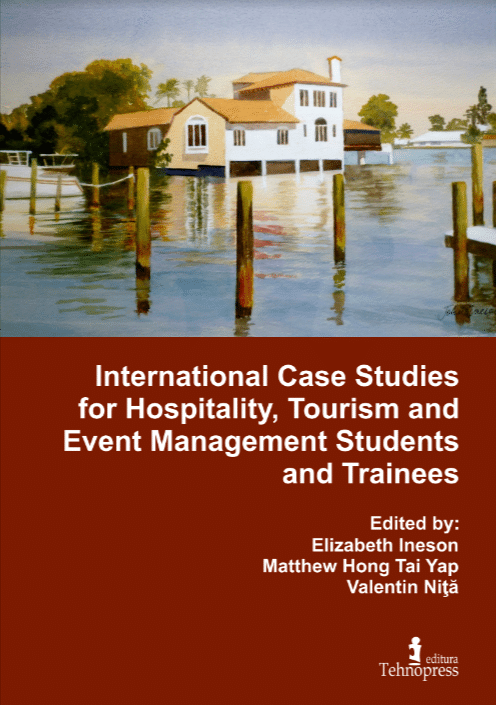
International Case Studies for Hospitality, Tourism and Event Management Students and Trainees
Author: Edited by: Elizabeth Ineson, Matthew Hong Tai Yap & Valentin Nita Category: Case Studies, Hospitality & Tourism ISBN: 978-606-687-351-2 File Size: 5mb More DetailsVolume 9 comprises a further series of international case studies, focusing on problems and key issues related to hospitality, tourism and event management. They originate from, or are set, not only in Central and Eastern Europe, including Bosnia and Herzegovina, Czech Republic, Hungary, Latvia, Serbia, Slovakia and Ukraine, but also in Austria, Bermuda, Canada, China, Ghana, Italy, Kenya, Macau, Singapore, Spain, Taiwan and the United States of America. The contributors, who represent 18 countries, have developed the cases based on their specialist knowledge and real-life experiences. The cases offer students, management trainees and managers opportunities to consider and to respond to realistic scenarios of varying and increasing complexity.
The introduction provides a brief overview of the case study and its possible role in teaching, and training, particularly in cross-disciplinary fields. To provide a suitable format, the cases have been divided into two sections: Part 1, non-revealed and Part 2, revealed. Part 2 is further subdivided into two sections (i) and (ii). The cases in the first section (2i) require the students/trainees either to read prior to, or after, the class/training; they may also require some individual written work. In the latter instance (2ii), there may be a requirement for further follow up activities or discussions.
The main topics covered are: cultural issues; guest satisfaction; guest and employee management; service quality and standards; food and beverages (including food hygiene; local gastronomy; menu planning; restaurant management); marketing/advertising; cultural tourism; revenue management; front office procedures; human resources; on-line booking; dark tourism; medical tourism; niche tourism; overtourism; urban tourism; tour planning; festivals; ethics; sustainability; safety and security; impacts of national and local disruptive events on tourism; leadership styles; academic integrity; risk management; and general management.
The non-revealed case studies may be distributed as part of a teaching or training session, and responses may be prepared by the individuals, debated by groups of students, trainees or managers, or enacted using role play, to develop a joint solution; the cases focus on at least one curriculum area or department, for example: food and beverage; human resources; front office; etc. Each non-revealed case either poses at least one question for consideration by students, trainees or managers and/or indicates one or more activities which might be undertaken within or outside the teaching/training session. Furthermore, the cases may require some preparatory work, in addition to follow-up reading, that the facilitator considers to be advantageous in advance of the discussion sessions.
The revealed case studies are more complex. They are inter/cross-disciplinary, encouraging consideration of issues and problems that focus on broader managerial, international and cultural perspectives. Some of the revealed cases are accompanied by reading or research suggestions which are recommended in order to respond to the questions and/or inform the participants so that they can conduct the follow-up activities which include: application of theories to practice; debates; interviews; analysing statistical data; SWOT analysis; menu planning; checking and designing systems; location and interpretation of regulations; evaluating information in the light of practical and written evidence; interpreting statistics; making sensible practical recommendations based on evidence; justifying actions with theory; online searching and research projects; preparation of guidelines, training information and presentations; planning tours and events; development of strategies and action plans; and report writing.
The case questions and activities are designed to encourage and promote experiential learning, embracing a practical problem-solving approach to achieve the learning outcomes. They are of varying types, levels of difficulty from very simple to extremely complex, posed to promote activities such as brain-storming followed by practical and theoretical problem-solving. Part 3 includes a series of points to promote discussion or further consideration of the issues pertaining to each case.












